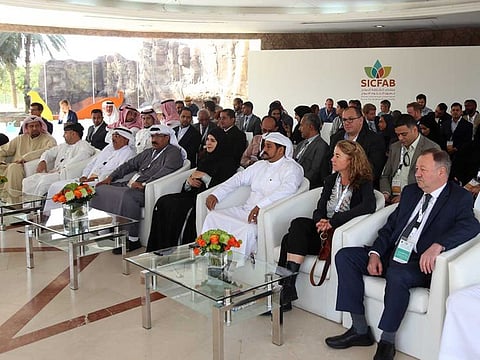UAE has the second largest population of dugong in the world: say experts
Experts at Sharjah Conservation Forum discuss the importance of marine mammals

Sharjah: UAE is the second country in the world having the largest population of dugong, say experts gathering ed at the 21st Sharjah International Conservation Forum for Arabian Biodiversity (SICFAB).
There are an estaimted 7,300 dugong are living in the Arabian Gulf with 3,000 are believed to inhabit Abu Dhabi waters.
Researchers, experts and scientists who gathered at the forum organised by the Environment and Protected Areas Authority (EPAA) discussed the importance of safeguarding marine mammals to maintain a healthy ecosystem.
The forum this year witnessed the participation of 158 experts, specialists, researchers and academics from 14 countries. The forum, which began on February 3 ended on February 6.
Of the marine mammals in focus at the forum, dugong — affectionately known as sea cows was a key topic of discussion. It is noted that there are about 22 species of mammals founds in the Arabian Gulf, Gulf of Oman, Arabian Sea, Gulf of Aden and Red Sea. Of all the mammals, dugong, a medium-sized marine mammal that is closely related to manatees is found in dense population in the UAE. Surrounded with extensive seagrass fields off the shores of Dubai and Abu Dhabi, The Murawah Marine Biosphere Reserve continues to support the highest density of dugongs in Abu Dhabi waters followed by Al Yasat Marine Protected Area.
As home to majority of dugongs in the Gulf, the cute sea mammal has been protected under UAE law since 1999. However, it has been noted that runaway development, oil pollution and illegal fishing nets (69.7 per cent) followed by vessel strikes (13.7 per cent), as well as unaccounted reasons (16.6 per cent) have led to high mortality rates.
Dugongs were also killed for hundreds of years for their meat and oil. One of their closest relatives, the Steller’s sea cow, has already been hunted into extinction.
Today, dugongs are listed as vulnerable to extinction by the International Union for Conservation of Nature.
“We need dugongs as they are important for maintaining healthy marine ecosystems. These are nursery areas for many fish species and thus important for food security in the region. Alarmingly, 29 per cent of the world’s seagrass has already disappeared, which is only going to further reduce the population of dugongs. Through the medium of this forum, I call out to all habitants of this planet to use the natural resources well, and stop destruction to mother nature,” said Maitha Al Hameli from The Environment Agency Abu Dhabi (EAD) who presented on marine mammals at the forum.
Strong ecosystems rely on maintaining a healthy and diverse assemblage of plants and animals. Given their importance in the ecosystem, all species of marine mammals, particularly the most endangered ones including species of whales, seals porpoises, and dugongs should be safeguarded.







